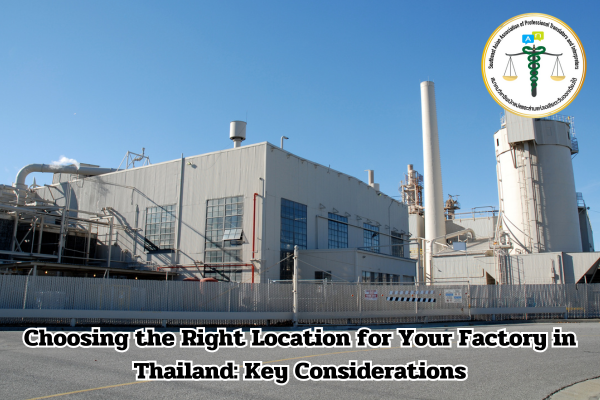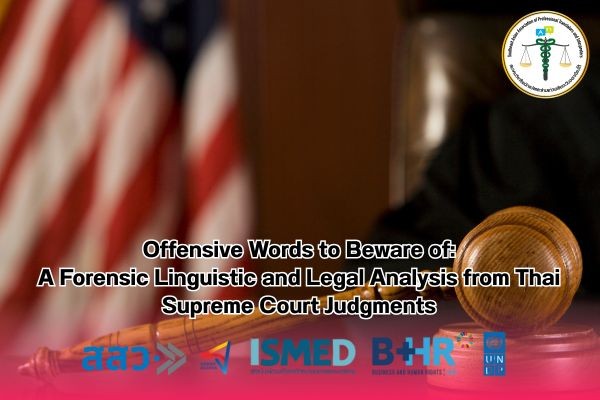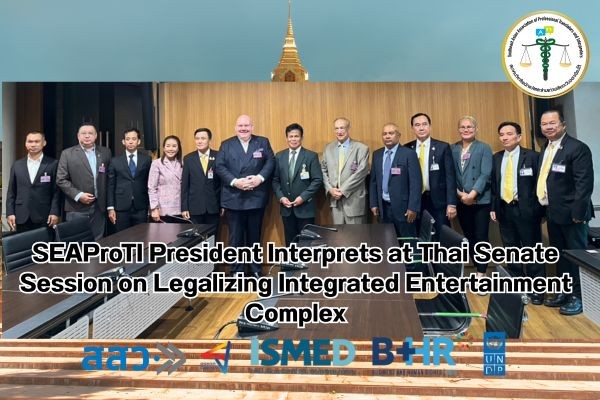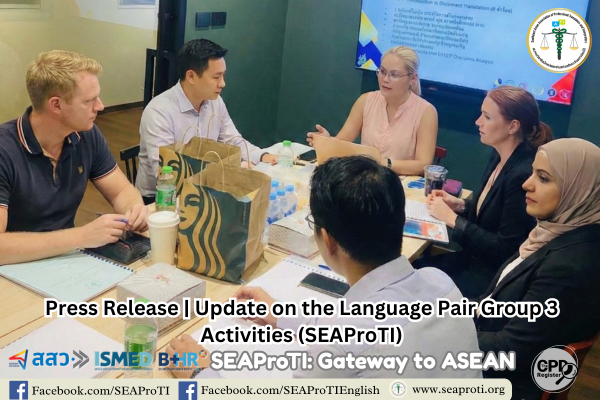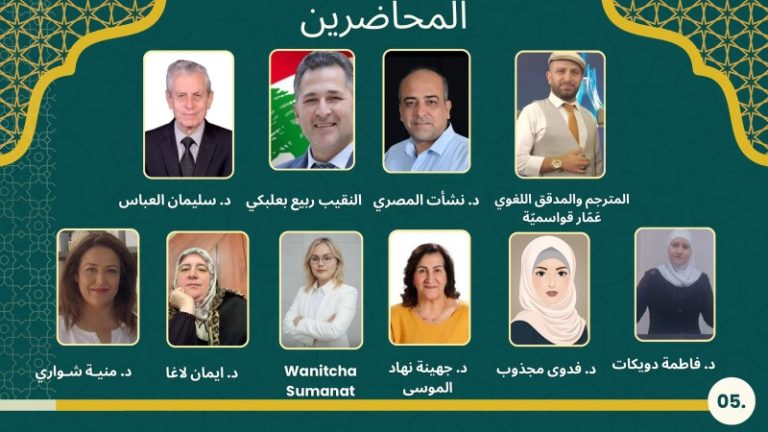Choosing the Right Location for a Factory in Thailand and the Role of the Southeast Asian Professional Translators and Interpreters Association (SEAProTI) in the Process
6 February 2025, Bangkok – Choosing the right location for building a factory in Thailand is a crucial decision for foreign investors, as the right site can greatly affect the efficiency and success of business operations. In Thailand, there are several potential sites where investors can establish factories, each with its own advantages and disadvantages. Primarily, there are three main options: Industrial Estates, Purple Zone Land outside of Industrial Estates, and Green Zone Land. The most suitable choice depends on various factors that investors must carefully consider.
Industrial Estates: The Best Option
Industrial estates are generally the best choice for foreign investors looking to set up a factory in Thailand. These areas are specifically designated for industrial activities, offering a wide range of infrastructure and services that make operations smoother and more efficient. Industrial estates typically provide essential utilities such as water, electricity, sewage systems, and other public services, all managed by the estate authorities, saving investors time and effort in setting up these systems.
Additionally, industrial estates are often strategically located near seaports or transportation hubs, making it easier and more cost-effective to ship goods internationally. This location advantage is crucial for reducing operational costs and improving logistics.
Factories located in industrial estates are also eligible for special investment promotions from the Board of Investment (BOI) in Zones 2 or 3, offering tax incentives and other benefits that can greatly assist in business growth and operational efficiency.
Purple Zone Land Outside of Industrial Estates: A Viable Option with Extra Responsibilities
Another option for building a factory is purple zone land located outside of industrial estates. While these areas are still zoned for industrial use and make it easier to obtain construction permits, there are certain challenges that come with this option. Investors will need to manage infrastructure, including water supply, electricity, waste management, and other utilities, independently, unlike in industrial estates where these services are already in place.
However, a notable advantage of locating a factory in a purple zone area is that if the land is in a higher elevation, it could be more resistant to flooding, an issue that many parts of Thailand face during the rainy season.
Green Zone Land: The Least Recommended Option
Green zone land, or land that is not designated for industrial use, is the least favorable option for establishing a factory. The primary issue with green zone land is that the size and type of factory that can be built are heavily restricted by Thai law. For instance, factories in green zones are typically limited to less than 50 horsepower, which restricts the possibility of heavy or medium-heavy industrial activities.
Furthermore, changing the zoning from green zone to purple zone involves a lengthy and bureaucratic process, which can be time-consuming and challenging. The process includes public hearings to gather feedback from local residents and must ultimately be approved by the Cabinet, making it an impractical option for most investors.
The Role of the Southeast Asian Professional Translators and Interpreters Association (SEAProTI) in the Process
For foreign investors looking to establish a factory in Thailand, dealing with government agencies often requires submitting documents translated from English or other foreign languages into Thai. This is where the Southeast Asian Professional Translators and Interpreters Association (SEAProTI) plays an important role. SEAProTI members, including certified translators and interpreters, can provide accurate and legally accepted translations of documents, ensuring that the investment process is smooth and efficient.
SEAProTI-certified translators are highly skilled in translating legal, technical, and business-related documents, ensuring that they meet all legal requirements in Thailand. This ensures that foreign investors’ documents are properly understood by local authorities, minimizing the risk of errors or misinterpretations that could delay the approval process.
In addition to providing certified translation services, SEAProTI also offers interpreting services for meetings, interviews, or any other communication with government officials. Certified interpreters help ensure smooth communication between foreign investors and Thai officials, which is vital during meetings to discuss factory construction permits and other business dealings.
Conclusion
Choosing the right location for a factory in Thailand is a critical decision that requires careful consideration of various factors. Industrial estates are generally the best choice, offering convenience and access to essential services and investment incentives. However, purple zone land and green zone land may still be viable options depending on specific business needs, though they come with additional responsibilities or limitations.
The Southeast Asian Professional Translators and Interpreters Association (SEAProTI) plays a key role in supporting foreign investors through the translation and interpretation process. SEAProTI’s certified translators and interpreters help ensure that documents and communication with Thai authorities are accurate, legally valid, and understood clearly, allowing for a smoother and more efficient process in establishing a factory in Thailand.
SEAProTI’s certified translators, translation certification providers, and certified interpreters:
The Southeast Asian Association of Professional Translators and Interpreters (SEAProTI) has officially announced the criteria and qualifications for individuals to register as “Certified Translators,” “Translation Certification Providers,” and “Certified Interpreters” under the association’s regulations. These guidelines are detailed in Sections 9 and 10 of the Royal Thai Government Gazette, issued by the Secretariat of the Cabinet under the Office of the Prime Minister of the Kingdom of Thailand, dated July 25, 2024, Volume 141, Part 66 Ng, Page 100.
To read the full publication, visit the Royal Thai Government Gazette
การเลือกทำเลที่ตั้งสำหรับการสร้างโรงงานในประเทศไทยและบทบาทของสมาคมวิชาชีพนักแปลและล่ามแห่งเอเชียตะวันออกเฉียงใต้ (SEAProTI) ในกระบวนการต่างๆ
6 กุมภาพันธ์ 2568, กรุงเทพมหานคร – การเลือกทำเลที่ตั้งสำหรับสร้างโรงงานในประเทศไทยเป็นสิ่งสำคัญที่นักลงทุนต่างชาติไม่ควรมองข้าม เพราะทำเลที่ตั้งที่ดีสามารถช่วยให้การดำเนินธุรกิจราบรื่นและประสบความสำเร็จได้เร็วขึ้น โดยในประเทศไทยมีหลายทำเลที่นักลงทุนสามารถเลือกใช้ในการสร้างโรงงาน ซึ่งแต่ละทำเลก็มีข้อดีข้อเสียที่แตกต่างกันไป โดยหลักๆ แล้ว จะมีอยู่ 3 ตัวเลือกที่นักลงทุนสามารถเลือกใช้ ได้แก่ เขตอุตสาหกรรม ที่ดินในเขตอุตสาหกรรม (Purple Zone) นอกเขตอุตสาหกรรม และที่ดินในเขตที่ไม่ใช่พื้นที่อุตสาหกรรม (Green Zone) ซึ่งการเลือกทำเลที่ตั้งที่เหมาะสมที่สุดจะขึ้นอยู่กับหลายปัจจัยที่นักลงทุนต้องพิจารณาให้ดี
เขตอุตสาหกรรม: ตัวเลือกที่ดีที่สุด
เขตอุตสาหกรรมถือเป็นทางเลือกที่เหมาะสมที่สุดสำหรับนักลงทุนที่ต้องการสร้างโรงงานในประเทศไทย เนื่องจากเขตอุตสาหกรรมได้รับการจัดสรรพื้นที่สำหรับการทำกิจการอุตสาหกรรมโดยเฉพาะ ซึ่งในเขตเหล่านี้จะมีสิ่งอำนวยความสะดวกที่พร้อมรองรับธุรกิจอุตสาหกรรมอย่างครบวงจร ทั้งการจัดหาน้ำประปา ไฟฟ้า การบำบัดน้ำเสีย และระบบสาธารณูปโภคอื่นๆ ที่จะช่วยให้การดำเนินงานของโรงงานมีความสะดวกและประหยัดเวลาในการจัดการเรื่องเหล่านี้
นอกจากนี้ เขตอุตสาหกรรมยังมักตั้งอยู่ใกล้กับท่าเรือหรือศูนย์ขนส่งต่างๆ ทำให้การขนส่งสินค้าเป็นไปได้ง่ายและรวดเร็ว ซึ่งเป็นปัจจัยที่สำคัญสำหรับการลดต้นทุนในการผลิตและการขนส่งสินค้าไปยังตลาดต่างประเทศ
การเลือกตั้งโรงงานในเขตอุตสาหกรรมยังมีข้อดีอีกประการหนึ่ง คือ การได้รับการส่งเสริมจากคณะกรรมการส่งเสริมการลงทุน (BOI) ในโซนที่ 2 หรือ 3 ซึ่งมีสิทธิประโยชน์ทางด้านภาษีและการสนับสนุนต่างๆ ที่สามารถช่วยให้ธุรกิจเติบโตได้อย่างรวดเร็วและมีประสิทธิภาพ
ที่ดินในเขต Purple Zone นอกเขตอุตสาหกรรม: ตัวเลือกที่ดีแต่ต้องดูแลเอง
อีกหนึ่งทางเลือกที่สามารถใช้ในการสร้างโรงงานได้ คือ ที่ดินในเขต Purple Zone ที่ไม่ได้อยู่ในเขตอุตสาหกรรม แต่ยังคงได้รับการกำหนดให้เป็นพื้นที่ที่สามารถทำกิจการอุตสาหกรรมได้ โดยทั่วไปแล้ว การขออนุญาตในการสร้างโรงงานในที่ดินประเภทนี้จะค่อนข้างราบรื่น เนื่องจากเป็นพื้นที่ที่ได้รับการอนุมัติให้ใช้ในกิจการอุตสาหกรรมอยู่แล้ว
อย่างไรก็ตาม การตั้งโรงงานในที่ดินประเภทนี้อาจไม่สะดวกเท่ากับเขตอุตสาหกรรม เนื่องจากนักลงทุนจะต้องดูแลเรื่องต่างๆ เช่น การจัดหาน้ำประปา ไฟฟ้า ระบบบำบัดน้ำเสีย และสิ่งอำนวยความสะดวกต่างๆ ด้วยตนเอง ซึ่งอาจต้องใช้เวลาและค่าใช้จ่ายเพิ่มขึ้น
อีกข้อดีของการเลือกที่ดินในเขต Purple Zone ที่ตั้งอยู่ในพื้นที่สูง คือ การป้องกันน้ำท่วม ซึ่งอาจช่วยให้โรงงานของนักลงทุนไม่ประสบปัญหาน้ำท่วมในช่วงฤดูฝน
ที่ดินในเขต Green Zone: ทางเลือกที่ควรหลีกเลี่ยง
สำหรับที่ดินที่อยู่ในเขต Green Zone หรือที่ดินที่ไม่ได้กำหนดให้เป็นพื้นที่สำหรับอุตสาหกรรม จะมีข้อจำกัดในเรื่องของขนาดและประเภทของกิจการที่สามารถทำได้ตามกฎหมายของไทย โดยทั่วไปแล้ว การตั้งโรงงานในเขตนี้จะมีข้อจำกัดในการใช้งานเครื่องจักรที่มีขนาดไม่เกิน 50 แรงม้า ซึ่งทำให้ไม่สามารถทำการผลิตในระดับอุตสาหกรรมหนักหรืออุตสาหกรรมกลางหนักได้
นอกจากนี้ การเปลี่ยนแปลงการใช้ประโยชน์จากที่ดินในเขต Green Zone ไปเป็น Purple Zone จะต้องผ่านกระบวนการที่ซับซ้อนและใช้เวลานาน เนื่องจากต้องมีการประชุมรับฟังความคิดเห็นจากประชาชนในพื้นที่ และต้องได้รับการอนุมัติจากคณะรัฐมนตรี ซึ่งทำให้การดำเนินการยากและใช้เวลานานมาก
บทบาทของสมาคมวิชาชีพนักแปลและล่ามแห่งเอเชียตะวันออกเฉียงใต้ (SEAProTI) ในกระบวนการต่างๆ
สำหรับนักลงทุนต่างชาติที่ต้องการตั้งโรงงานในประเทศไทย การดำเนินการต่างๆ กับหน่วยงานราชการจำเป็นต้องใช้เอกสารที่ถูกแปลจากภาษาอังกฤษหรือภาษาต่างประเทศเป็นภาษาไทย สมาคมวิชาชีพนักแปลและล่ามแห่งเอเชียตะวันออกเฉียงใต้ (SEAProTI) มีบทบาทสำคัญในการสนับสนุนกระบวนการนี้ โดยการให้บริการแปลเอกสารที่ถูกต้องและเชื่อถือได้ เพื่อให้การขออนุญาตในการตั้งโรงงานและการดำเนินธุรกิจเป็นไปอย่างราบรื่นและถูกต้องตามกฎหมาย
สมาชิกของ SEAProTI ซึ่งประกอบไปด้วยนักแปลและล่ามที่ได้รับการรับรองจากสมาคม จะสามารถช่วยแปลเอกสารให้ตรงตามข้อกำหนดทางกฎหมายและความเข้าใจในภาษาไทยได้อย่างครบถ้วนและมีความถูกต้อง นักแปลที่ได้รับการรับรองจาก SEAProTI จะช่วยให้การแปลเอกสารทางธุรกิจเป็นไปอย่างมีมาตรฐาน ทำให้เอกสารที่นักลงทุนต่างชาติยื่นต่อหน่วยงานราชการได้รับการยอมรับและไม่มีปัญหาความเข้าใจผิด
นอกจากนี้ SEAProTI ยังมีบทบาทในการให้คำปรึกษาเกี่ยวกับการแปลในกรณีที่มีการจัดการประชุมหรือสัมภาษณ์ระหว่างนักลงทุนต่างชาติและเจ้าหน้าที่ของไทย โดยล่ามที่ได้รับการรับรองจาก SEAProTI จะช่วยให้การสื่อสารระหว่างสองฝ่ายเป็นไปอย่างราบรื่นและถูกต้อง ซึ่งเป็นสิ่งสำคัญในการประสานงานและดำเนินการต่างๆ ในการตั้งโรงงาน
สรุป
การเลือกทำเลที่ตั้งสำหรับการสร้างโรงงานในประเทศไทยถือเป็นการตัดสินใจที่สำคัญมาก โดยนักลงทุนต้องพิจารณาถึงข้อดีข้อเสียของแต่ละประเภทของที่ดิน และตรวจสอบให้แน่ใจว่าที่ดินที่เลือกนั้นเหมาะสมกับประเภทของธุรกิจที่ต้องการดำเนินการ นอกจากนี้ บทบาทของสมาคมวิชาชีพนักแปลและล่ามแห่งเอเชียตะวันออกเฉียงใต้ (SEAProTI) ในการช่วยแปลเอกสารและให้คำปรึกษาในการติดต่อกับหน่วยงานราชการก็เป็นส่วนสำคัญที่จะช่วยให้กระบวนการทั้งหมดเป็นไปได้อย่างราบรื่นและถูกต้องตามกฎหมาย
เกี่ยวกับนักแปลรับรอง ผู้รับรองการแปล และล่ามรับรองของสมาคมวิชาชีพนักแปลและล่ามแห่งเอเชียตะวันออกเฉียงใต้
สมาคมวิชาชีพนักแปลและล่ามแห่งเอเชียตะวันออกเฉียงใต้ (SEAProTI) ได้ประกาศหลักเกณฑ์และคุณสมบัติผู้ที่ขึ้นทะเบียนเป็น “นักแปลรับรอง (Certified Translators) และผู้รับรองการแปล (Translation Certification Providers) และล่ามรับรอง (Certified Interpreters)” ของสมาคม หมวดที่ 9 และหมวดที่ 10 ในราชกิจจานุเบกษา ของสำนักเลขาธิการคณะรัฐมนตรี ในสำนักนายกรัฐมนตรี แห่งราชอาณาจักรไทย ลงวันที่ 25 ก.ค. 2567 เล่มที่ 141 ตอนที่ 66 ง หน้า 100 อ่านฉบับเต็มได้ที่: นักแปลรับรอง ผู้รับรองการแปล และล่ามรับรอง


